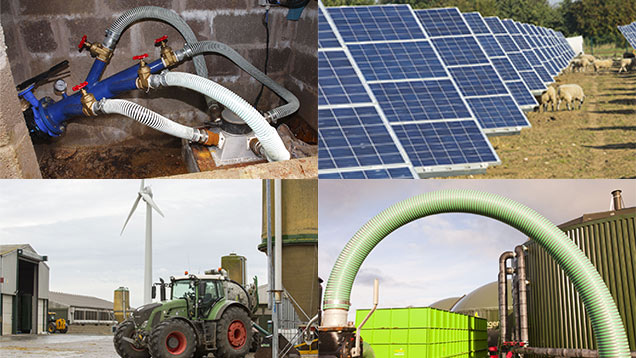Parties make wide range of green energy manifesto pledges
 (c) Rex-Shutterstock
(c) Rex-Shutterstock Political attitudes to renewable energy will play a key role in determining future opportunities for farmers and landowners. With less than a fortnight to go until the general election, Paul Spackman examines the manifesto pledges of the main parties
Conservatives
Claiming to be the “greenest government ever”, the Tories say they support the UK Climate Change Act and are keen to cut greenhouse gases as “cost-effectively as possible”. But their manifesto has sparked criticism from the renewables sector, not least for plans to end subsidies for new onshore wind farms. Wind industry body Renewable UK deputy chief executive Maf Smith has called the proposal “idiotic”.
“Overall, this is an anti-green growth, anti-clean energy manifesto that will only find favour with the dwindling bunch of fossil fuel advocates who still donate to the Conservative party and thus dictate their energy policy,” he said.
Industry view
The NFU is not commenting on individual party manifestos, but chief renewables advisor Jonathan Scurlock says the union’s two main requests of all major political parties are to:
- Establish a clear renewables strategy with industry utilising anaerobic digestion, biofuels, biomass, by-products, solar and wind
- Have consistent low-carbon energy policy covering incentives, planning, grid access and energy storage.
The manifesto fails to mention key technologies such as solar and biomass, with most focus on promoting energy efficiency and a significant expansion in new nuclear and gas (including shale gas).
Measures outlined include:
- End subsidies for new onshore wind farms
- Tighten planning controls and give local people the final say on wind farm applications
- Start-up funding for “promising new renewable technologies and research”, with greatest support only to those representing value for money
- Ensure every home and business has a Smart Meter by 2020
- Make it possible for consumers to switch energy suppliers within one day
- Support for low-cost energy efficiency measures (target to insulate one million more homes over five years)
- Support for development of shale gas, North Sea oil and gas.
See also: Election 2015 – Importance of farming and rural vote in marginals revealed
Labour
Ambitious emissions targets to tackle climate change are at the centre of Labour’s energy policy. It sets the goal of becoming carbon neutral (i.e. carbon emissions are balanced by mitigation measures) in the second half of this century and for all UK electricity to be carbon-free by 2030.
Other pledges include:
- Create an energy security board to plan and deliver a mix of energy sources, including renewables, nuclear, green gas, carbon capture and storage, and coal
- To freeze energy bills until 2017 (allowing prices to fall, but not rise) and reform the energy market to make pricing simpler and more transparent
- Big Six energy companies required to “open their books” and sell electricity through an open exchange rather than generating their own and selling it to their supply businesses
- New energy watchdog to enforce reforms
- One million interest-free loans for energy home improvements
- Additional powers for the Green Investment Bank (GIB) to invest in green technology
- Create one million additional green jobs
- A robust environmental and regulatory regime before extraction of unconventional oil or gas can take place.
Liberal Democrats
The Lib Dems also have a strong focus on cutting emissions, with a target for Britain to be zero-carbon by 2050. While they are keen to reduce waste and encourage recycling, solar again fails to get a mention and they also favour ending support for crop-based biofuels after 2020.
Energy policies include:
- Focus biomass for heating and small-scale power generation
- Emphasis on reducing waste and encouraging the growth of anaerobic digestion to produce biogas for heat, transport and sustainable fertiliser
- Extend separated food waste collections to at least 90% of homes by 2020
- Additional financial and regulatory support for community energy
- Encourage onshore wind where appropriate and end “ideologically motivated interference” in local planning decisions by ministers
- More energy efficiency targets for households
- Greater power to the GIB to boost investment in low-carbon technology
- Help farmers adapt to climate change, including soil protection and forest carbon sinks
- Increase R&D and commercialisation support in four key technologies: tidal power, carbon capture and storage, energy storage and ultra-low-emission vehicles.
Green Party
Renewable energy is a key policy area for the Greens, who want a 90% reduction in UK greenhouse gases in the next 15-20 years and a zero-carbon economy by 2050. There is support for most renewable technologies and a number of ambitious targets, including:
- Encourage more community ownership of renewables, with grid operators giving priority to community schemes – target of 42GW of community power by 2020
- Investment in large- and small-scale renewable generation and grid – £35bn over the parliament
- Expansion of mature technologies such as solar and onshore wind by lowering costs and reducing planning constraints
- Develop sustainable biomass generation
- Improving energy efficiency in homes and businesses
- Support for the Feed-in Tariffs and Renewable Heat Incentive schemes
- Phase out all fossil fuel-based technology and nuclear over the next decade and ban fracking.
Ukip
Renewables find little favour with Ukip, which claims green energy policies only make energy more expensive and supply less reliable. Its proposals include:
- Scrap the 2008 Climate Change Act
- End wind and solar subsidies and abolish green levies
- Support renewable energy where it can deliver electricity at competitive prices
- Revive the coal industry and support fracking for shale gas.
